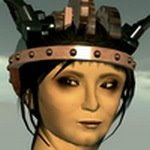Our very own Keystone Bouchard (aka Jon Brouchard) continues to trailblaze. He and his team at Studio Wikitecture - a group he co-founded on the principles of Web 2.0-based architectural collaboration methodologies - have taken the Open Architecture Network's Founders Award for their entry and design of the Nyaya Tele-Medicine facility in Western Nepal. The goal was to design a wired medical clinic in the Himalayan foothills that will connect 250,000 people to doctors around the world via the Internet.
Why did you decide to enter this when there is no cash award?
Keystone Bouchard: Since the 'Open Architecture Network' mission is all about open sourcing architecture for humanitarian purposes, we thought it would be a perfect opportunity to submit an entry for this competition, composed in the same collaborative and open-source fashion.
The bottom line: this is about connecting architecture and technology with communities in need. As Turk Pipkin points out in this video, the winners don't actually win a prize; rather, they win an opportunity to help change the world.
Here's a time lapse video of Studio Wikitecture's evolving design:
The Wiki-Tree is a version tracking system that - instead of tracking text documents in a linear history like Wikipedia - tracks versions of 3-dimensional models and saves them within a continually evolving 3-dimensional digital tree 'canopy'. Like Wikipedia, this 3D-Wiki allows a loose, self-organized group of contributors to share ideas, edit the contributions of others, and vote on which design iterations should be considered for further refinement.
What's next, Keystone?
Keystone Bouchard: Our top priority, at this point, is to build more awareness of Wikitecture's potential, recruit more 'Wikitects' and find our next project. Ideally, we would like to take on a paid project that will actually be built in Real Life, but we are open to other possibilities as well. We still have a lot to learn, but we have gathered a tremendous amount of qualified and diverse talent within the Wikitecture community from around the world, and are confident we can meet or exceed the level of service offered by a traditional architectural practice model.
We're also hoping to find some investment, financing or sponsorship to help develop the Wikitecture technology into Phase 2. We have a long list of improvements we want to make, but primarily we need to simplify the interface and improve the web-side technology.
The competition was announced at the 2007 TED Conference and launched at the 2007 World Economic Forum in Africa in June.
Monday, June 9, 2008
Kudos, Studio Wikitecture - Winner of the 2007 AMD Open Architecture Network Challenge's Founders Award
Posted by
Bettina Tizzy
at
8:37 PM
![]()
Labels: architecture, award, community, Jon Brouchard, Keystone Bouchard, Open Architecture Network, Studio Wikitecture, technology, TED, WEF







0 comments:
Post a Comment